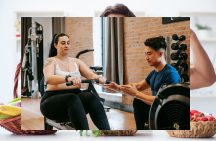Knowing when and what to eat can make a difference in your workout. Understand the connection between eating and exercise
eating and exercise go hand in hand. When and what you eat depends on how you feel while exercising. And it’s important to think about what you eat while exercising, whether you’re doing a casual workout or training for a competition. Consider trying these eating and exercise tips.
Also, Are you looking for outdoor gym equipment manufacturers in India?
1. Eat a healthy breakfast
If you exercise in the morning, get up early enough to eat breakfast at least an hour before your workout. Get plenty of energy before you work out._
Studies show that eating or drinking carbohydrates before exercise can help you perform better during your workout. And carbohydrates can help you work out longer or more intensely. If you don’t eat, you may feel slow or dizzy while exercising.
If you plan to exercise within an hour of breakfast, eat a light meal. Or have a sports drink. Focus on carbohydrates for maximum energy.
Good breakfast options include:
- Whole-grain cereals or bread.
- Low-fat milk.
- Juice.
- A banana.
- Yogurt.
And remember, if you usually drink coffee in the morning, it’s probably fine to have a cup before you workout. Also, know that any time you try a food or beverage for the first time before a workout, you run the risk of an upset stomach.
2. Watch the portion size
Be careful about how much you eat before exercise. General guidelines recommend:
Large meals. Eat these at least 3 to 4 hours before exercise.
Small meals or snacks. Eat these about 1 to 3 hours before exercise.
Eating too much before exercise can make you feel sluggish. Eating too little may not give you the energy you need to feel strong during your workout.
3. Snack well
Most people can eat small snacks right before and during exercise. The main thing is how you feel. Do what works best for you. If your workout lasts less than 60 minutes, snacks eaten right before exercise may not give you extra energy. But they can keep you from feeling hungry.
If your workout is longer than 60 minutes, it may be helpful to have a carbohydrate-rich food or drink during the workout. Good snack options include:
- An energy bar.
- A banana, an apple or other fresh fruit.
- Yogurt.
- A fruit smoothie.
- A whole-grain bagel or crackers.
- A low-fat granola bar.
- A peanut butter sandwich.
- Sports drink or diluted juice.
A healthy breakfast is especially important if you plan to exercise several hours after a meal.
4. Eat after you exercise
If possible, eat a meal containing both carbohydrates and protein within two hours of your workout. Eating after a workout helps muscles recover and replenish their glycogen stores. Consider having a snack if your meal is more than two hours away. Good options for post-workout meals include:
- Yogurt and fruit.
- Peanut butter sandwich.
- Low-fat chocolate milk and pretzels.
- Post-workout recovery smoothie.
- Turkey on whole-grain bread with vegetables.
5. Drink up
Don’t forget to drink fluids. You need to drink enough fluids before, during, and after exercise to prevent dehydration.
To stay adequately hydrated for exercise, the American College of Sports Medicine recommends that you:
- Drink about 2 to 3 cups (473 to 710 milliliters) of water 2 to 3 hours before your workout.
- Drink about 1/2 to 1 cup (118 to 237 milliliters) of water every 15 to 20 minutes during your workout. Vary the amount of water depending on your body size and the weather.
- Drink about 2 to 3 cups (473 to 710 milliliters) of water after your workout, so that you drink about 1 pound (0.5 kilograms) of water for every pound (0.5 kilograms) you lost during your workout.
Water is usually the best way to replace lost fluids. But if you’re exercising for more than 60 minutes, try a sports drink. Sports drinks can help maintain your body’s electrolyte balance. And they may give you a little more energy because they contain carbohydrates.
Let experience be your guide
Remember that the duration and intensity of your activity can help you decide how often and what you should eat and drink. For example, running a marathon will require more energy from food than running or walking a few miles. And try not to introduce any new products into your diet before a long-lasting sporting event. It’s best to try products before the event to see how your system handles the food.
When it comes to eating and exercise, everyone is different. So pay attention to how you feel during your workouts and how what you eat affects your overall performance. Let your experience guide you in what eating habits work best for you before and after exercise. Think about keeping a journal to see how your body responds to meals and snacks so you can tweak your diet to perform at your best.
